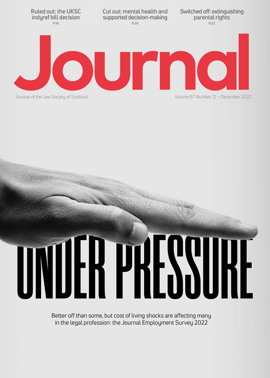When tracing really matters

Genealogist and former senior police officer Alan Eadie knows from experience how the transition of policing skills to genealogy investigation not only bears positive results for his legal clients, but sometimes can be life-changing for the people he actually finds.
“As a CID officer I was used to tracing people who had committed serious crimes, people who really didn’t want to be found,” he observes. “In our genealogy investigations the opposite is the case: the people we are seeking usually do want to be found; they sometimes just don’t know it. Also, in human terms, the results can often be uplifting, if not life-changing.”
Eadie’s company is now established as one of the leading Scottish genealogy tracing firms, working on behalf of the legal industry for some time now.
The company’s process is to thoroughly research each family’s history, then to investigate and trace living family beneficiaries. But the process does not stop there, as the preference is to interview family members or other key persons, not only to corroborate research, but to assist in finding others. It is a tried and tested method that has shown results which never fall below 97%.
Eadie explains further: “Research can only take us so far at times. We are police-trained interviewers, and talking to people, sometimes allied to field work, gets the best results.”
Case of the fostered grandchild
An example was an instruction from a firm of solicitors. An elderly lady had died and left a will. She was estranged from her grandson when he was a young child, and lost all contact, due to no fault of hers. She left a considerable legacy in her will to him. However, no one knew his whereabouts.
The deceased woman’s son (the grandson’s father) had died a young man. The grandson’s mother was a drug and alcohol abuser, and the grandchild was deemed at risk by social services, being raised with various foster parents.
Eadie’s firm were instructed to find him. The grandson was 19 years old by this time, and it was believed he might even have changed his name.
Following initial research at Register House in Edinburgh, the firm also conducted field investigations. After much hard work, the grandchild’s mother was traced, through social media and her associates. She was living rough. When interviewed, she was able to provide some details as to the grandson’s possible last known whereabouts, and confirmed he was in foster care.
Contact was also made through social services with previous foster parents, who came forward with vital information. All of that work resulted in the grandson being traced. Eadie’s firm wrote to him and he agreed to be interviewed.
A sensitively conducted interview then took place with the grandson.
“The interview,” Eadie recalls, “was very emotional for the young man. Despite obstacles, he had made a go at life and was applying for university. He was living frugally and holding down two low paid jobs. The legacy was life-changing for him, and he broke down crying when speaking about his past. He had never forgotten his grandmother and was grateful that she had, in turn, never forgotten him.”
Persistence pays
Every case has its challenges, and Eadie explains his firm’s persistence when trying to trace people.
“We are always very determined in these investigations. Not only do we want to bring successful results to our legal clients, we are so aware that sometimes beneficiaries like that young man may badly need their legacy.”
Perspectives
Features
Briefings
- Criminal court: Farewell retrospective
- Agriculture: A future support framework
- Corporate: Is there a creditor duty?
- Intellectual property: "Reclaiming the UK statute book"
- Sport: Flouting their own rules?
- Succession: Crofting tenancy transfers in intestacy
- Scottish Solicitors' Discipline Tribunal: December 2022
- Property: Conveyancing – the future is in our hands
- In-house: With a fair wind






